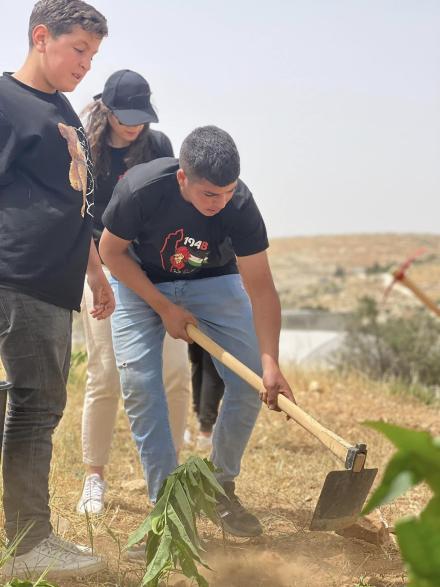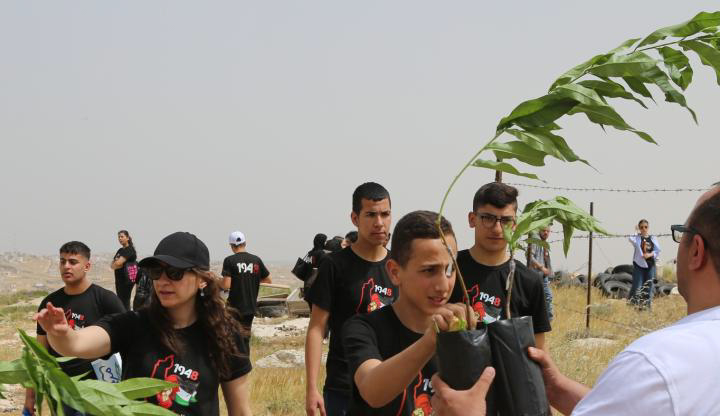Palestinian refugee youth commemorated the 75th anniversary of Nakba by visiting Masafer Yatta in the southern-occupied West Bank, which is at risk of forced evictions and transfer. Nakba, meaning “the catastrophe” in Arabic, refers to the displacement, depopulation, and despair of hundreds of thousands of Palestinians in 1948.

Palestinians commemorate the Nakba on May 15 every year in remembrance of the forced displacement 75 years ago. More than 750,000 Palestinians were uprooted from their homeland, more than 400 villages and towns were destroyed, and thousands of people were killed.
The 75th anniversary of the Nakba came at a critical time of increasing Israeli military escalation against the Gaza Strip, the most recent of which lasted for five days and resulted in the deaths of at least 33 Palestinians, including three women and six children.
After 75 years, Palestinians continue to experience Nakba through Israeli policies of excessive use of force against civilians, arrests of children and youth, forced displacement, looting of natural resources, annexation, repression, denial of residency, segregation, fragmentation and isolation, home demolitions, and the imposition of discriminatory planning and permit systems.
Palestinian youth planting trees. Photo: ActionAid.
ActionAid Palestine supported this youth mobilization to lead solidarity and advocacy actions with other Palestinians who are at risk of displacement. Those advocacy actions also aim to remind the international community of the Palestinian Nakba and the right to return according to the international UN resolution 194. Palestinian youth showed leadership skills during the activity they designed and implemented.
Youth from refugee camps in Bethlehem and other areas gathered at the entrance of Aida refugee camp, which is marked with a large key as a peaceful symbolic representation of this right to return. Then, they headed to Masafer Yatta to start their solidarity actions by planting trees and exchanging experiences of displacement.
The head of the village council of al-Tuwani village in Masafer Yatta, Hafiz Herni, welcomed the youth and thanked them for their solidarity, saying:
“Thanks to refugee youth who came to plant trees to strengthen our existence and connectedness to this land. The land means everything for me, it is life, history, dreams and future. This solidarity visit means a lot for us as we are originally a refugee family, displaced in 1948 and we came here to al-Tuwani village in Masafer Yatta. We still feel that Nakaba is ongoing as our lands are still being targeted.”
Munther Amirah, a Palestinian refugee youth activist from the Aida refugee camp, said:
“We came here to Masafer Yatta to share with its residents the experiences of displacement that we and our ancestors have been experiencing since 1948. Masafer Yatta represents another Nakba.”
Rayan Abu Sror, a young refugee woman from the Aida refugee camp participating in this solidarity visit, said:
“This visit is a solidarity action and the planting of trees is one of the means of resistance and an expresion of the love of Palestinians for their land on this anniversary of Nakba. Masafer Yatta is an example of ongoing Nakba as it faces the forcible displacement that our ancestors faced in 1948.”
Masafer Yatta is home to 12 Palestinian villages totaling about 2,800 residents. They are agricultural communities that have lived there for generations. The Israeli army declared this area as “Firing Zone 918,” in the early 1980s in grave violation of international law, which prohibits the expulsion of a population from its land and the use of occupied land for military training. Families in Masafer Yatta are denied access to their land, roads, water sources, schools, medical services, and hospitals. They also suffer from daily violence at the hands of the Israeli military.
On May 4, 2022, the Israeli High Court issued its final decision in the decades-long case, rejecting the residents’ petition and giving the army the green light to forcibly evict these communities at a moment’s notice.
ActionAid stresses the fact that the rights of self-determination, freedom, and independence of Palestinians should be respected. We call on the international community to continue providing full support to Palestinian people to regain their rights as per international law and UN resolutions.

